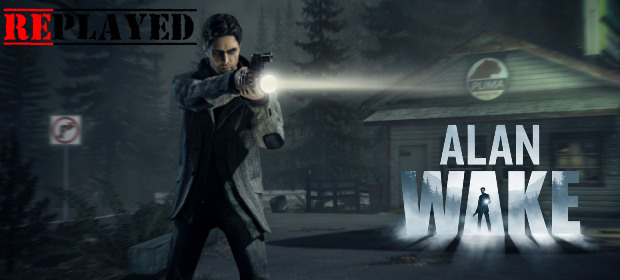Fear of the dark is often considered a childhood phobia, a malaise that torments adolescents with night terrors and the tricks of the mind and imagination. As we grow, we leave it behind with our other childhood baggage, our action figures and dolls and Saturday morning cartoons. However, those unlucky enough to carry such a fear into adulthood – perhaps as a result of some horrific trauma – can find it debilitating. Not being able to function without a light on is frightening enough when you’re a child swaddled in your Transformers quilt set; when you’re an adult, and such an irrational phobia is magnified by the rational fear of the very real threats of the world we live in, it can be horrific.
Alan Wake, a psychological horror from Finnish developers Remedy, deals with the darkness. Not only the fear of it and what it may hide, but a fantastical view of it as a sentient, patient antagonist that hounds our beleaguered hero throughout the game.
It begins with the titular writer retreating to Bright Falls, Washington, with his wife Alice to recuperate from an overly-long spell of writer’s block and insomnia. The town is peaceful, serene, idyllic. From a design point of view, it’s beautiful; exactly – and intentionally – like something from a Stephen King novel, evoking memories of Twin Peaks from the outset. They arrive by ferry crossing on the eve of an annual local shindig, “Deerfest”, all set to spend a few days at a picturesque island cabin on Cauldron Lake.
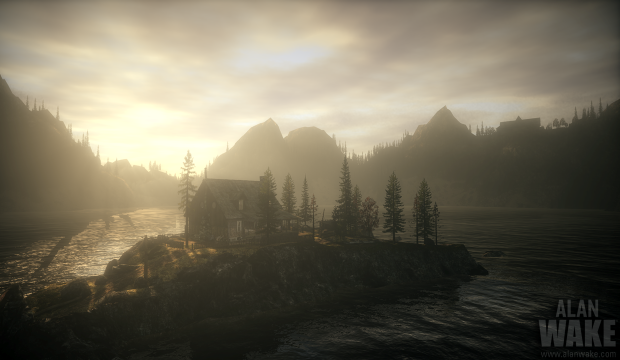
BLINDED BY THE LIGHT: As a reader, gamer, and movie-goer, alarm bells rang for me the moment I saw Cauldron Lake. It’s analogous to the setting of every “troubled writer chiller” in history. In real life it might appear creepy, but it would be everything a writer looking to escape the pressures of celebrity and recapture his mojo was looking for. In the world of contemporary horror fiction, however, such a place is the demesne of evil, the lair of ancient, terrible forces hidden in plain view of the unsuspecting town on which it feeds.
Along with his nyctophobic wife, Alan arrives at Cauldron Lake as the sun is setting, and within ten minutes the shit has hit the fan. Already plagued by nightmares of attackers wreathed in shadow and struggling to live a normal life, Alan finds his troubled psyche stretched further when Alice is dragged into the lake and he inexplicably wakes up having crashed his car – a whole week later.
It’s here that Alan first encounters the Taken, townsfolk possessed by the Dark Presence that lives beneath Cauldron Lake. Shrouded by shadow that must be “burned” off with a flashlight before Alan can do them harm, the Taken are – at least in these early stages – a terrifying menace. The way they talk and move is unsettling enough, without the oppressive lack of light hampering visibility and keeping you permanently on edge.
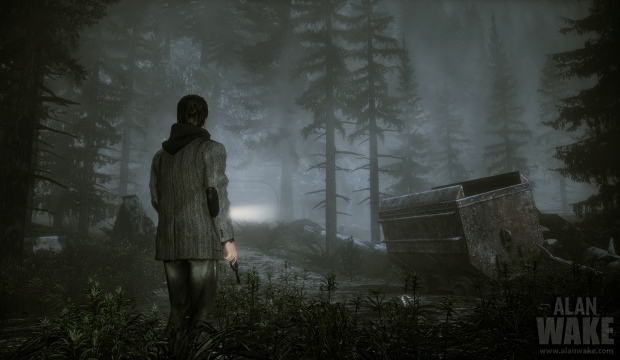
KEEPING IT REAL: Even in the day time, Bright Falls is a creepy place, peopled by characters that seem just that little bit “off”. That the town hides secrets is obvious, but what those secrets are carries the story beyond the realms of standard horror and into fantasy. Along with his best friend and manager, Barry, Alan investigates Cauldron Lake in an effort to clear his name: he becomes the prime suspect in Alice’s disappearance, a dilemma not helped by the fact that Cauldron Lake hasn’t had a cabin on it since an earthquake pulled it beneath the surface four years ago.
Barry is comic relief, for the most part, but more than that, his presence is a sarcastic, pragmatic yin to Alan’s disturbingly morose yang. As the Dark Presence sets about murdering or enslaving the community of Bright Falls and Alan is forced to talk to ghosts and fight against the possessed, Barry is his anchor to the real world. Charged with finding the missing pages of a manuscript called Departure – written by his hand during the week he can’t remember – Alan teeters on the edge of the abyss throughout. He’s a horror writer, and as such has a clear understanding of truth and fiction and the difference between the two; as the horrific events in Bright Falls spiral out of control, Alan finds it hard to keep a clear head. Without Barry, he’d probably never survive – certainly not with his sanity intact.
“When this is through, if we make it, I don’t care what anybody says; I am done with darkness. You’re going to buy me a tanning bed as a gift, and I’m gonna live in it!” – Barry Wheeler
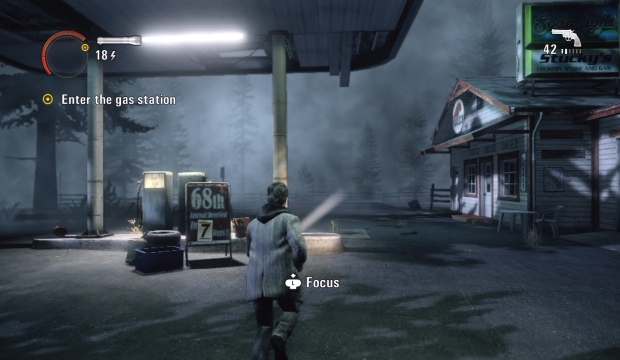
CARE IN THE COMMUNITY: Of course, sanity is a continuing theme in Alan Wake. At times, Alan wonders if he’s even innocent, or if this is all just a symptom of his anxiety. Being in close proximity to the local nuthouse doesn’t help: a getaway lodge for struggling artists sits nestled in the forest, run by the smug, self-satisfied Dr. Emil Hartman, whose work is the real reason Alice brought Alan to Bright Falls in the first place. It makes it somewhat ironic that the week Alan cannot remember was spent writing Departure at the behest of the Dark Presence.
It needs an escape route out of its watery prison, and it is somehow able to achieve it through the written word. Having previously killed the owner of the cabin, Thomas Zane (the deceased writer whose spirit helps guide Alan in the darkness), the Darkness now needs Alan to write it a way back into the real world. With reality and fantasy so tightly intertwined, anyone would struggle to keep it together.
Luckily, Alan has tools to help him: torches and flares to burn the darkness away and guns to defeat the weakened Taken, but there are times when it doesn’t feel like enough. Alan Wake has a rare ability to turn on a coin’s edge from safe and warm to fighting for your life, and the episodic structure manages to inject genuine tension with sudden cliffhangers.
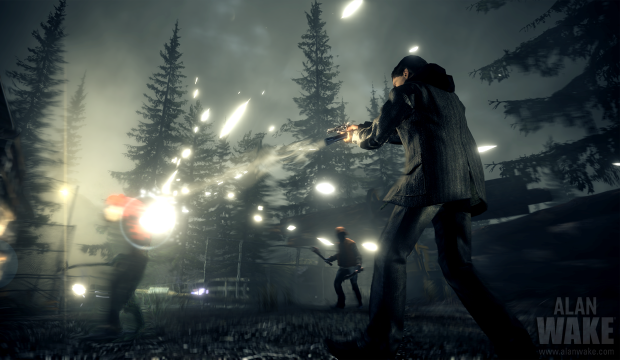
DO NOT ADJUST YOUR TV SET: Influenced by TV shows like Twin Peaks and The Twilight Zone (an analogy of which appears in the game world as episodes of a show called Night Springs), Alan Wake is broken into six episodes. Each ends on a cliffhanger with its own theme song, and is superseded by a “Previously on Alan Wake…” catch-up montage. You’d think it would be out of place, but it fits the atmosphere and narrative style like a well-worn hat. It also makes for one of the best game soundtracks in recent years, with tracks from Poets of the Fall, Nick Cave, the Bad Seeds and Poe, amongst others. The haunting song selection is spot on, conveying the mood perfectly to increase the suspense.
It’s also psychological. The relentless pace of the night time sections can be unsettling and exhausting, particularly on your first playthrough, and the story is less than clear cut. The episode breaks are a chance to recap what’s happened so far, and gives you a five-minute break before you have to get back to the life-or-death stuff.
Although the original decision to make Bright Falls an open-world environment was ditched in favour of a streamlined thriller narrative, there are opportunities to explore and goodies to find. While the blue thermoses dotted around the town and forest are simple collectibles, there are also radios playing Pat Maine’s local radio show, the content of which is occasionally disturbing – especially when he starts taking late-night calls from the townsfolk. You’ll also find television sets that play episodes of the Night Springs TV show, short, chilling mini-stories that serve to unsettle rather than scare. While it won’t always feel safe to go wandering around the woods, courage brings its own rewards.
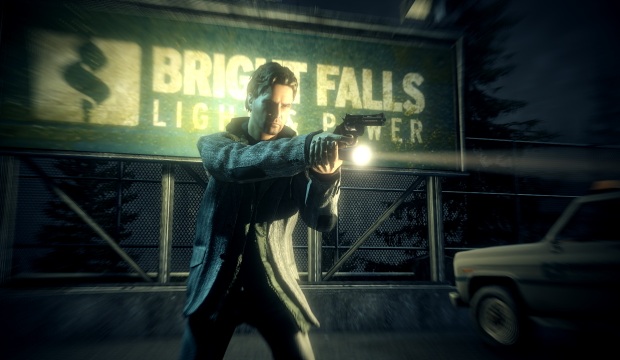
QUANTUM WHAT? Alan Wake is a fantasy as much as it’s a thriller. Eschewing the grotesque body-horror of games like Dead Space or even Silent Hill, Alan Wake is scary because it sets out to unsettle us, rather than shock us. The use of light and shadow, ancient, obscure mythology and the often sudden and unannounced shifts between daylight and night-time combine with a wonderfully-written narrative to deliver a genuinely engrossing experience, even outside the combat. Especially outside the combat.
And, like all good horror-fantasies, it’s not all doom and gloom. If Alan wants to overcome the Dark Presence and save his own mind and Alice’s life, he has to come to terms with the terrors of his new reality and fight back, vanquishing the darkness to become the Champion of Light. In many ways, Alan Wake is a quest story.
The lack of a true sequel is a bone of contention for some. While extra DLC episodes The Signal and The Writer continue the story after the ambiguous ending and Alan Wake’s American Nightmare presents what amounts to another adventure as the protagonist fights against Mr. Scratch, a twisted version of himself, the true sequel that all the fans are longing for is currently on hiatus while Remedy Entertainment make next-gen sci-fi blockbuster Quantum Break.
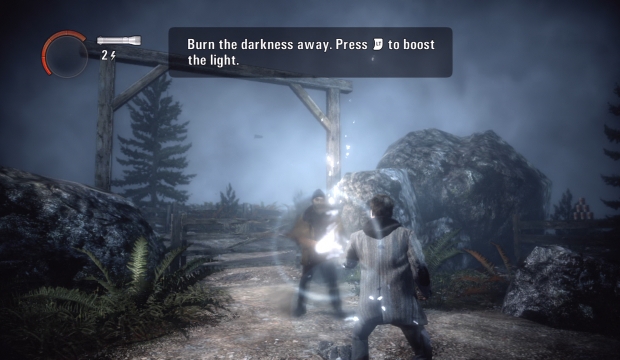
WAKE UP, ALAN: And so, we’re left waiting. Wondering what will become of Alan; if he’s dead, if he’ll ever escape Cauldron Lake and be rid of the Dark Presence. When Microsoft announced that Remedy were showing a new game at the Xbox One reveal, the excitement for a new Alan Wake game was palpable, perhaps stealing some of the shine from the unveiling of Quantum Break. It shouldn’t be taken as a negative, though (Quantum Break, after all, looks great), but rather as a testament to the popularity of Alan Wake.
It’s the fear of the unknown that lends Alan Wake its nightmarish quality. The dream-like disjointedness of events, the juxtaposition of Bright Falls’ daytime postcard-town allure and its violent, surreal night-time counterpart, and the high quality of the writing and voice acting combine in a game that almost feels like an interactive TV show, one where the well-being of the characters relies on your ability to martial your fear and take control.
Is Alan Wake a modern masterpiece? Maybe not. The ending left many confused and the action, while initially tense and frightening, soon becomes pedestrian and predictable once you’re fully armed and you’ve gotten the hang of defeating even large numbers of Taken. And yet, it is one of the most unique games in recent years, eschewing blockbuster set-pieces for slow-burn tension and a mystery that won’t quit. As we move inexorably towards the demise of the current generation, Alan Wake will be remembered as a game that truly stood out in the 360’s catalogue – and we can only hope that the next generation of consoles sees Remedy Entertainment return to Bright Falls and finish the tale of Alan and Alice Wake.


